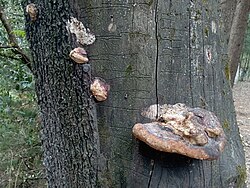Biology:Fomitopsis schrenkii
| Fomitopsis schrenkii | |
|---|---|

| |
| Scientific classification | |
| Domain: | Eukaryota |
| Kingdom: | Fungi |
| Division: | Basidiomycota |
| Class: | Agaricomycetes |
| Order: | Polyporales |
| Family: | Fomitopsidaceae |
| Genus: | Fomitopsis |
| Species: | F. schrenkii
|
| Binomial name | |
| Fomitopsis schrenkii Haight & Nakasone
| |
Fomitopsis schrenkii is a newly isolated species from the genus Fomitopsis. Previously thought to be identical to the red-belted conk, DNA analysis shows it is in fact a distinct species.[1] This species is named after Herman von Schrenk, a respected name in forest pathology.[1] It occurs most frequently in the Southwestern United States, and has a somewhat limited range.[1] It prefers coniferous trees and rarely associates on hardwoods.[1] This substrate preference and location range is most helpful in distinguishing F. schrenkii from its close relative, F. mounceae.
Description
Fomitopsis schrenkii is a perennial, woody conk with a fan-like shape.[1] The surface is smooth and can be resinous, and usually ends with a bumpy margin.[1] The colour usually follows a set pattern- at base a whiteish orange, then darkening to a true orange or brown, then lightening to a creamy-white at the margins.[1] Older specimens will darken to a grey or brown colour, with bands less visible but still distinct.[1] If broken open, the woody context of the conk is a light yellow or tan colour, with no distinct bands.[1] The underside of the conk is a light yellow or white colour, with 3-4 round pores per millimetre.[1] This species stains reddish or light brown in KOH.[1]
References
- ↑ 1.00 1.01 1.02 1.03 1.04 1.05 1.06 1.07 1.08 1.09 1.10 Haight, John-Erich; Nakasone, Karen K.; Laursen, Gary A.; Redhead, Scott A.; Taylor, D. Lee; Glaeser, Jessie A. (2019-03-04). "Fomitopsis mounceae and F. schrenkii—two new species from North America in the F. pinicola complex". Mycologia 111 (2): 339–357. doi:10.1080/00275514.2018.1564449. ISSN 0027-5514. PMID 30908115. https://doi.org/10.1080/00275514.2018.1564449.
Wikidata ☰ Q104861636 entry
 |

